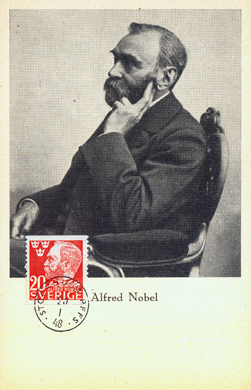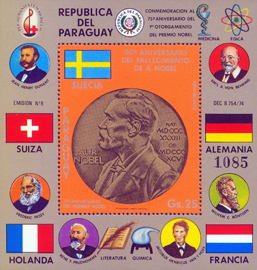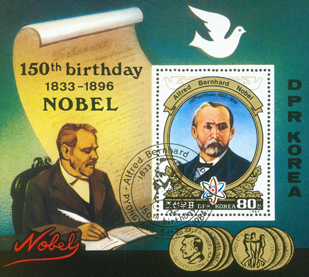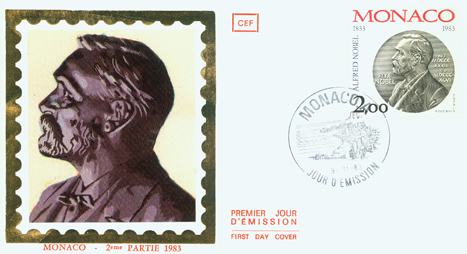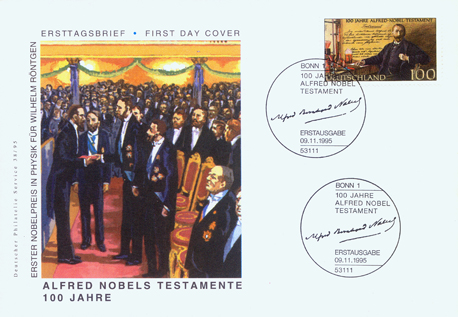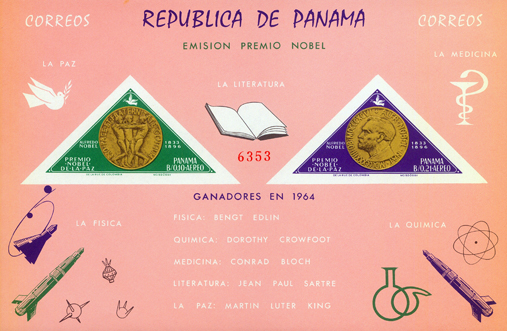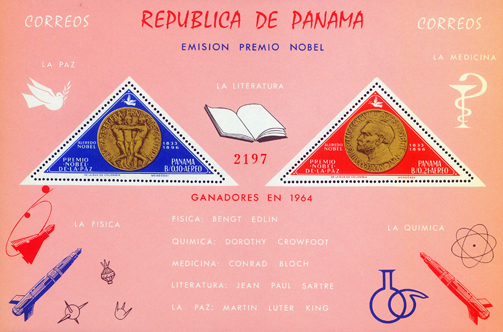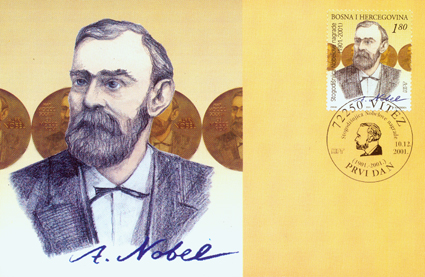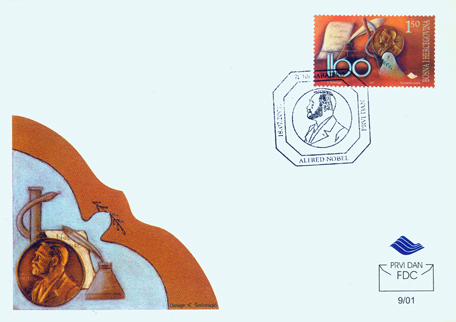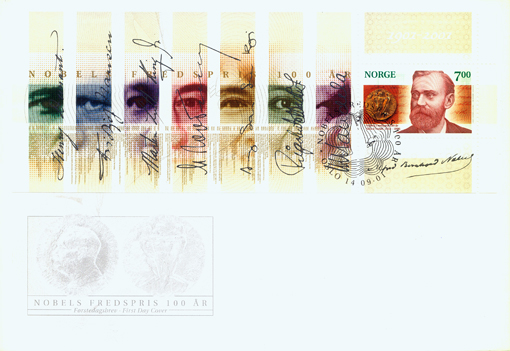Nobel & the Nobel Prizes
The Nobel Prize was named in honor of Alfred Bernhard Nobel, a famous Swedish chemistry scientist and inventor. The prize includes Nobel Prize in Physics, Nobel Prize in Chemistry, Nobel Prize in Physiology or Medicine, Nobel Prize in Literature, Nobel Prize in Peace and The Bank of Sweden Prize in Economic Sciences in Memory of Alfred Nobel.
|
|
Alfred Nobel was born at 9 Norrlandsgatan in Stockholm on October 21, 1833. His father, Immanuel Nobel, was a genius in mechanics and an architect as well. His mother, Andriette Nobel, took care of the whole family. |
Alfred Nobel had many inventions and patents and therefore some 90 Nobel "multinational companies" were built up in more than 20 ries. Alfred Nobel became very rich and famous. However, for the development of his enterprises and the improvement of his inventions, he traveled the world constantly and remained single.
Alfred Nobel died at home in San Remo in Italy on December 10, 1896 at the age of 63. On December 29, his cremains were buried at the side of his parents and brothers tombs at the northern suburb of Stockholm after a simple funeral.
In the late years of his life, Alfred Nobel had left two wills in 1893 and 1895 respectively. The last will in 1895 was once kept in Stockholm Bank and it was this version that was finally opened later.
In 1897, his will of less than 300 words was opened to the public formally.
The following is an excerpt from Alfred Nobels will dealing with the Nobel Prize:
"The whole of my remaining realizable estate shall be dealt with in the following way: the capital, invested in safe distributed in the form of prizes to those who, during the preceding year, shall have conferred the greatest benefit on mankind. The said interest shall be divided into five equal parts, which shall be apportioned as follows: one part to the person who shall have made the most important discovery or invention within the field of physics; one part to the person who shall have made the most important chemical discovery or improvement; one part to the person who shall have made the most important discovery within the domain of physiology or medicine; one part to the person who shall have produced in the field of literature the most outstanding work of an idealistic tendency; and one part to the person who shall have done the most or the best work for fraternity between nations, for the abolition or reduction of standing armies and for the holding and promotion of peace congresses. The prizes for physics and chemistry shall be awarded by the Swedish Academy of Sciences; that for the physiological or medical works by the Karolinska Institute in Stockholm; that for literature by the Academy in Stokcholm, and that for champions of peace by a committee of five persons to be elected by the Norwegian Storting. It is my express wish that in awarding the prizes no consideration whatever shall be given to the nationality of the candidates, but that the most worthy shall receive the prize, whether he be a Scandinavian or not".
This will was signed by Alfred Nobel at the Swedish Club in Paris, being made effective by the law.
After many years effort Nobels assets had a cash value of SEK 33,233,792.20 (equivalent to about 2 million).
|
|
|
On May 21, 1898, the king of Sweden, on behalf of the government and in the name of the nation and the people, d that Nobel’s will became effective by law and requested the royal Swedish Academy of Sciences, Swedish Karolinska Institute and the Swedish Academy, by Cooperation, to draft the Nobel’s will regulation and implementation rules.
On June 29, 1900, the King of Sweden in Council approved the statutes of the Nobel Foundation and the special regulations on how the Swedish prize-warding institutions should perform their duties.
The Nobel Foundation organizations include:
1) the Board and the Council; 2) four Prize-awarding Institutions: The Royal Swedish Academy of Sciences, The Nobel Assembly at the Karolinska Institute, The Swedish Academy and the Norwegian Nobel Committee; 3) five Nobel Committees, one for each prize section; and 4) four Nobel Institutes, one for each Prize-Awarding Institutions. The Nobel Foundation is responsible for all the details related to the prize awarding.
According to Alfred Nobels will, the Nobel Prizes in Physics and Chemistry are awarded by the Royal Swedish Academy of Sciences; the Nobel Prize in physiology or Medicine is awarded by the Nobel Assembly at the Karolinska Institute; the Nobel Prize in Literature is awarded by the Swedish Academy; the Nobel Prize in Peace is awarded by the Norwegian Nobel Committee whose five members are appointed by the Norwegian Parliament. Since 1969, the Nobel Prize in Economics has been awarded by the Royal Swedish Academy of Sciences.
|
|
The Nobel Foundation once experienced financial problems for some time, since Nobel d in his will that the bulk of his fortune should be invested in a fund composed of stable securities. In 1953, based on a practical consideration, the Swedish government decided to give the Foundation greater freedom to choose its investments. At present, 30% of the fund were invested abroad, 20% invested in stock market in Sweden, 40% in bonds, and 10% in real estate. Because of the active financial management, the Foundation assets have been increased rapidly. So far, the Foundation assets have a value of about SEK 1 billion (equivalent to US $150 million). The amount of the prize each year is mainly dependent on the amount of income of the Foundation the same year.
The prize amount (sum of the money) varied greatly over the years. The first year in 1901 it amounted to US $ 35,000; in 1935, the total was US $ 42,000; in 1979, the amount was US $ 190,000; in 1993, it was US $ 840,000; in 2000, it was 960,000 and in the year of 2010, the total amount of the prize reached US $ 1,460,000. Due to the recognition of the Nobel Foundations effort by the people all over the world, in order to support the important role played by the Foundation in promoting the development of sciences and the understanding among ries, many relevant founds, organizations and individuals in different ries have made great contributions to the Nobel Foundation with a considerable amount of money.
In addition, the Foundation has one regulation: If a prize-winner declines the prize, or before the 1st of October in the calendar year immediately following fails to cash the prize-awarders chequer for the amount of the prize in the manner stipulated by the Board, the amount of the prize shall be added to the main found.
There are five Nobel Committees that are responsible for the nomination, investigation and ion of the candidates for each of the five Nobel Prizes. The ed candidates by the Committee should be presented on a certain date to the Royal Swedish Academy of Sciences, the Nobel Assembly at the Karolinska Institute and the Swedish Academy for their approval.
|
|
|
The procedures of nomination and ion of the Nobel Laureates are very strict. Each year the respective committees sent individual invitations to thousands of scientists, members of academies and university professors in large number of ries all over the world, asking them to nominate candidates for the Nobel Prizes for the coming year. The nomination must be submitted to the relevant Nobel Prize Committees by February 1st. The competent nominators include: Members of the Nobel Committees, former Nobel Prize Laureates, and members of Prize-warding institutions; Specially appointed university professors and invited professors at prize-awarding institutions; Specially invited professors by Nobel Committees, and the presidents of writer association (for Nobel Literature Prize); International institutions and organizations (for Nobel Peace Prize); Parliament members or government officials and former and active members of the Norwegian Nobel Committee (for Nobel Peace Prize); World well-known scholars.
Nobody can nominate himself or herself. The Sweden Government and the Norwegian Government have no any authority to interrupt the normal work of the Nobel Committee in processing the nominations, to express its support for or opposite to any particular nominees. No officials of any kinds like diplomats have any influence of their nominations of or supports for any candidate on the final results. From February 1st on, the Nobel Committees begin the investigation of the nominated candidates. And the reports of all nominated candidates should be sent in by September. The Nobel Committees are the exclusive authorities in making decisions in relation to the Nobel Prize awarding affairs. They hold meetings under extreme secrete situations to screen and with great caution the nominated candidates. After the meeting discussion comes the vote for finalization of the prize-awarding approval. In October, the Nobel Committees make public the name list of the Nobel Prizes Laureates and at the same time inform the Laureates themselves of the results by telegram.
The day of December 10 is the commemorative day of the death of Alfred Bernhard Nobel. On this day, there is a formal ceremony for the Prize Awarding in the Stockholm Concert House and the Oslo City Hall. Apart from the Laureates and the King and Queen of Sweden, the participation also include well-known scientists, academician, professors, public activists, important figures from different social strata, the key members of the Swedish Royalty, senior government officials, and foreign diplomats, amounting up to more than 1,000 (including hundreds of students and sponsors). The evening dinner banquet and dance ball follows the prize awarding ceremony.
|
|
At half past four on December 10 every year, the Prize Laureates, accompanied by the members of the Nobel Committees, walk into the Stockholm Concert House and the Oslo City Hall. Just before the awarding, the President of Nobel Foundation briefs in Swedish the major contribution of the Laureates and the Laureates are invited to present their speech in their native language. Then, the Sweden King hands the diploma and the gold medal to each proud laureate in person and delivers His congratulation. The formal banquet usually lasts about two hours in the Blue Hall of Stockholm City Hall with about 1300 participants. The Nobel Prize diploma is unique. Usually the laureates name is printed on it, which is surrounded by a text relevant to the particular prize. The Nobel Prize Medal is made of gold weighted about half pound and is in a shape of round with the Alfred Bernhard Nobels portrait and his birth and death date on the front side. There is some difference between the portrait on the Swedish-issued Nobel Prize Medal of Physics, Chemistry, Physiology or Medicine, Literature and Norway-issued Nobel Prize Medal of Peace. At the other side of the Medal, a picture relevant to the particular prize and the name of the laureate and the date of prize awarding are printed. According to the Statutes of the Nobel Foundation, a prize may be awarded to just one work or may be equally divided between two works each of which may be regarded to merit a prize or may be jointed awarded by two or three persons if the work which is to be rewarded has been produced by them together. In addition to all the mentioned above, the Peace Prize may also awarded to an organization or an institution. It can be noticed from the 100 years of the prize awarding, one prize, if jointly awarded, is usually shared by no than three persons. Work produced by a person since his or her death will not be considered for an award; if, however, a prize-winner dies before he or she has received the prize, then the prize may still be presented, for example, the Nobel Peace Prize laureate in 1961, Dag Hammarskj?ld (Sweden economist and diplomat), who was Secretary General of the UN since 1953. On September 17 in 1961 he died of airplane crash while he was dealing with the problem of the Belgian Congo, in Africa. Norwegian Storting decided to award him the Nobel Peace Prize that year one month after his death for his great contribution to the UN affairs. |
Since 1901 to 2014, except a-few-year ceasing due to the two World Wars, there have been 860 individual laureates (among which 301 are alive) of the Nobel Prizes in Physics, Chemistry, Physiology or Medicine, Literature, Economic Sciences and Peace, and there have been 22 organizations and institutions that were awarded the Nobel Peace Prize. French scientist, Marie Curie, was awarded the Nobel Physics Prize in 1903 and the Nobel Chemistry Prize in 1911; American scientist, Linus Carl Pauling, was awarded the Nobel Chemistry Prize in 1954 and the Nobel Peace Prize in 1962; American scientist, John Bardeen, was awarded the Nobel Physics Prize two times, respectively in 1956 and in 1972. British scientist, Frederick Sanger, has been awarded the Nobel Chemistry Prize in 1958 and in 1980. International Committee of the Red Cross has been awarded the Nobel Peace Prize three times, respectively in 1917, 1944 and 1963 while Office of the United Nations High Commissioner for Refugees has been awarded the Nobel Peace Prize two times, respectively in 1954 and 1981.
The evaluation on the nominated candidates is very strict, and their work usually have to stand long-term proof-test in practice. For example, it was early in the year 1953 that the 1962 Nobel Physiology or Medicine Prize laureate, Francis Harry Compton Crick (Great Britain), had proposed the model of double-helix DNA; and the 1949 Nobel Physics Prize laureate, Hideki Yukawa (Japanese), had predicted in the year of 1934 the existence of mesons on the basis of theoretical work on nuclear forces, which was proved in 1947.
Though, no other prizes so far can replace the eminent position and authority of the Nobel Prize. The Nobel Prizes have contributed extraordinary much to the human beings peace movements and justice undertakings, the advancement and development in sciences, and the prosperity of literature and such contribution will last.
2018 Nobel Prize Award Ceremony will be held in "Nobel Center", a waterfront building central in Stockholm. The building was designed by British architect Mr. Chipperfield and it locates close to Blasi Island and neighbors the Swedish National Museum. The building includes an auditorium, museum, multiple conference rooms, office space, library, restaurant, coffee shop with bar and shops. The project will take off in 2015 and estimated completion date will be in December, 2018.

